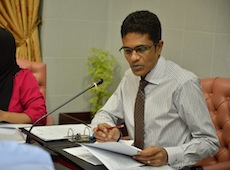The People’s Majlis’ public accounts committee (PAC) yesterday approved a request by President Abdulla Yameen to reintroduce a discontinued car allowance for cabinet ministers.
A motion by Maldives Development Alliance (MDA) MP Ahmed Amir to grant the request was approved with seven votes in favour and six against after Chair MP Ahmed Nihan – parliamentary group leader of the ruling Progressive Party of Maldives (PPM) – cast the tie-breaking vote.
Opposition Maldivian Democratic Party (MDP) MPs and Jumhooree Party (JP) MPs voted against the motion. The PAC is comprised of six PPM MPs along with one MP from coalition partner MDA as well as four MDP MPs and two JP MPs.
The committee’s decision will be put to a vote on the Majlis floor.
Under the previous parliament in December 2012, the PAC had decided to discontinue an MVR6,500 (US$422) monthly salary for drivers of ministers’ cars as well as an MVR1,000 (US$65) allowance for petrol cost. Ministers were instructed to settle the expenses out of their salaries from April 2013 onward.
The PAC decision was later voted through on the Majlis floor on December 31 as part of a revised pay scheme for senior officials in the executive, judiciary, and independent institutions.
The elimination of both the salary for drivers and the fuel allowance was estimated to save 89 percent from the budget item. Cabinet ministers presently earn a monthly salary of MVR57,500 (US$3,729).
The task of determining salaries and allowances is entrusted to the PAC – also referred to as the finance committee – under section 100(a) of the parliamentary rules of procedures.
Article 102 of the constitution states, “The president, vice president, members of the cabinet, members of the People’s Majlis, including the speaker and deputy speaker, members of the judiciary, and members of the independent commissions and independent offices shall be paid such salary and allowances as determined by the People’s Majlis.”
In its meeting yesterday, the PAC also commenced a review of the state’s salary structure or pay scheme.
Executive expenses
 During the debate on reintroducing the car allowance yesterday, MDP MPs suggested studying the government’s request further after summoning the finance minister.
During the debate on reintroducing the car allowance yesterday, MDP MPs suggested studying the government’s request further after summoning the finance minister.
MP Ibrahim Mohamed Solih – parliamentary group leader of the MDP – argued that it would be “irresponsible” to approve additional expenditures without scrutiny.
The proposal was however rejected by pro-government MPs after the chair said the issue had been thoroughly considered by the PAC in the previous parliament.
MDP MPs also objected to increasing expenditure on ministers while doctors and teachers were unhappy with their renumeration.
Meanwhile, a paper prepared by the parliament secretariat on expenses by the executive in 2013 was deliberated by the committee.
The paper – subsequently shared with local media – reportedly revealed that MVR913,277 (US$59,227) was spent out of the budget last year to provide the allowance to ministers under former President Dr Mohamed Waheed’s administration between April and November 2013.
The allowance was provided to the health minister, economic development minister, tourism minister, fisheries minister, defence minister, Islamic affairs minister, housing minister, youth minister, education minister, transport minister, finance minister and the attorney general.
While MDP MP Ibrahim Shareef contended that the allowance was provided in violation of public finance laws and should be investigated by parliament, MP Nihan insisted that there was no proof of wrongdoing in the document.